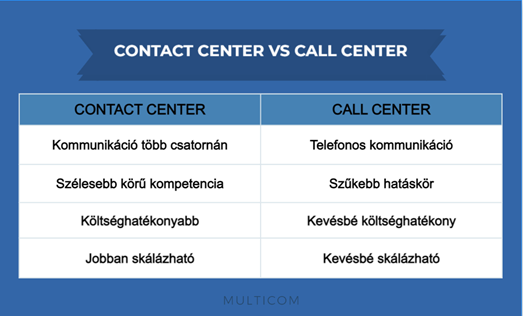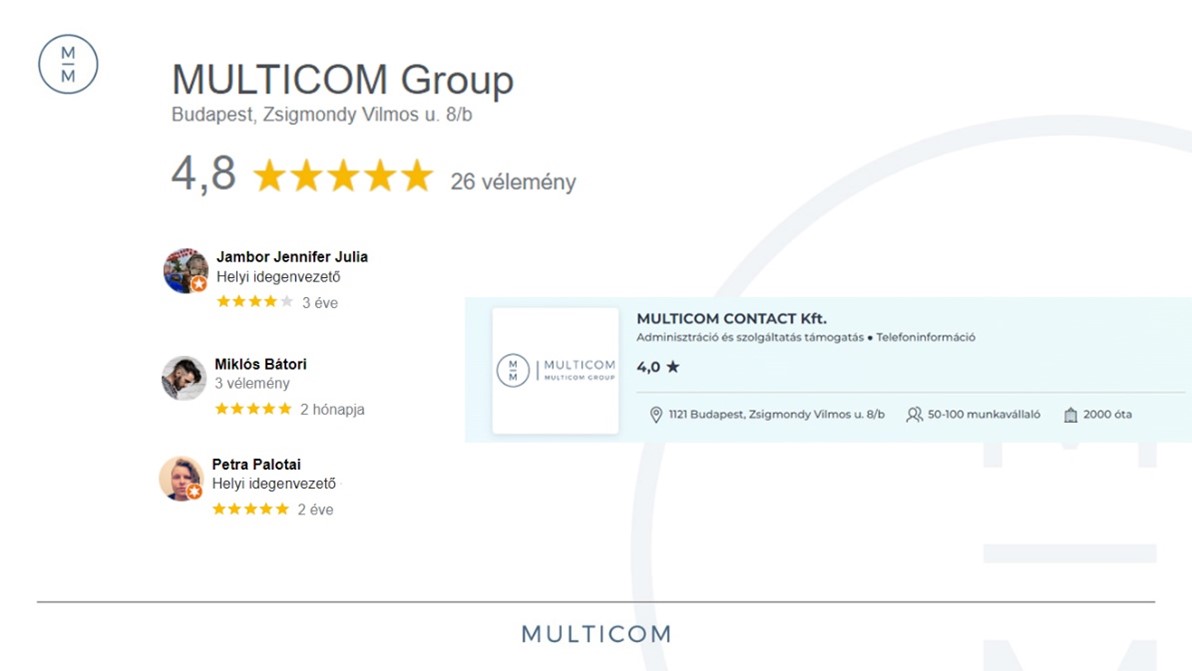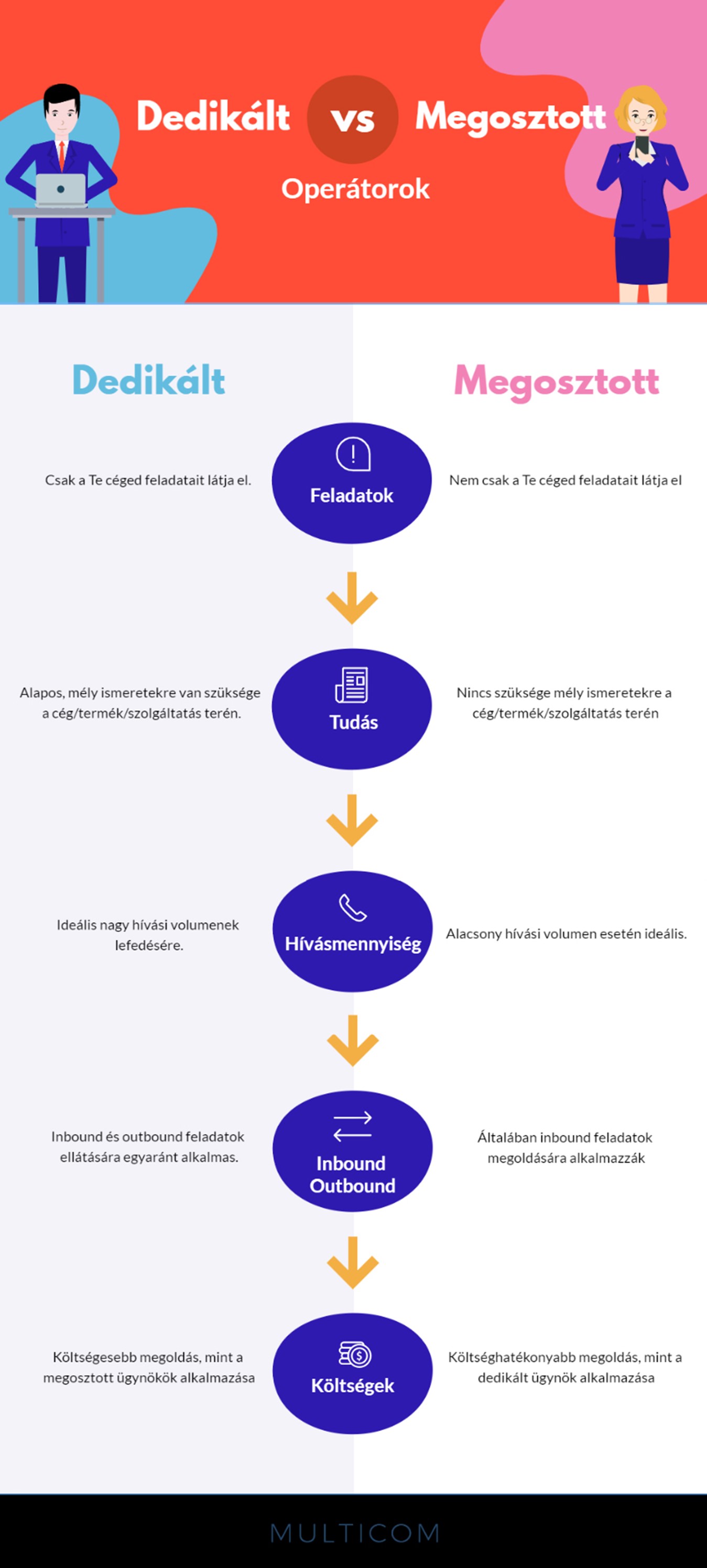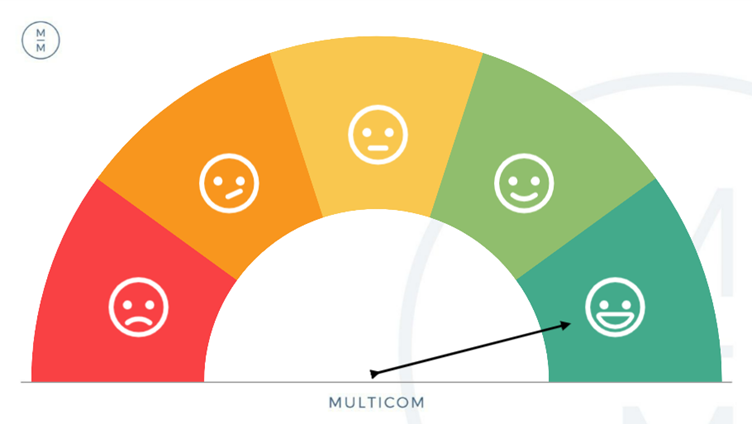The call center service today is very different from what it used to be. The demand for phone-based customer service has increased, the number of services has expanded, and the options to facilitate customer service have become richer. As a result, the call center has now become more of a contact center – but more on that later.
The question is: what should be considered before requesting a call center service?
- What is a call center?
- What does a call center do?
- How can call center companies help?
- What options do call center providers offer?
- What could be the benefits of a call center?
- When is it advisable to outsource phone-based customer service tasks?
First, it's important to clarify exactly what the call center's role is. Today, customer service doesn't just provide information over the phone. With technological advancements, customers' informational needs have also changed.
According to the State of Service research, 67% of customers believe that consumer experience expectations are much more important than before. This experience can be enhanced with more and more tools and services.
Another very important aspect is real-time call center service. According to satisfaction surveys, 96% of customers stated that a well-functioning phone-based customer service builds trust, and 90% expect real-time communication.
In contrast, another statistic reported that 91% of respondents had only bad experiences within 6 months.
There are numerous channels and tools available to meet customers' informational needs – while also reducing the call center's waiting time.
The benefits of an efficient and always available call center are undeniable.
But what can you do to ensure that the services provided by phone-based customer service best support your company's interests?
First, let's take a look at exactly what a call center is.
What is a Call Center? (Answering customer calls ≠ call center)
Customer service is a crucial aspect of any business, but sometimes calls can become such a burden that they interfere with daily tasks. When answering phones, emails, and other inquiries hinders operations, it's time to partner with a call center.
Call centers do much more than just handle incoming and outgoing calls.

Call centers enable companies to outsource communication management at a fraction of the cost of hiring additional employees.
Customer service call centers help to outsource communication tasks at lower costs.
Let's make it clear from the start: a personal conversation is completely different from interacting with a robot.
According to a study, 83% of customers find it much more reassuring to speak with a real person when they are in a difficult situation than with a machine.
This is the biggest advantage of a call center.
Call centers generally reach out to customers with service offers or provide traditional support by answering incoming calls.
More and more companies are recognizing the opportunities in proactive customer service and how much a well-designed call center can help maintain stronger customer relationships.
Call centers are typically fast-paced, requiring and managing numerous employees and tasks. Thus, the call center goes beyond customer satisfaction.
They are also responsible for the following:
- Improving incoming and outgoing communication between staff and customers
- Enhancing daily operations and more efficient communication
- Employee training and coaching
- Communication among team members
- Timely and fast development
- Task scheduling
- Integration and knowledge of new technologies
- Compliance with regulations regarding call centers
Many companies face the decision of whether to handle customer service tasks themselves or outsource them.
Operating a call center is no small challenge: outsourcing can help a company grow. In fact, in this case, many resources can be freed up.
But let's dive deeper into the topic!
There are two types of outsourced call centers: inbound and outbound call centers.

Inbound Call Center
An inbound call center handles (either partially or entirely) incoming phone calls and other inquiries related to your business. This can include sales inquiries, but it is generally focused on customer service and support issues.
The most common inbound services include:
- Customer service
- Technical support, helpdesk
- Order taking
- Inbound sales
- Email and chat services
- Order processing
- Complaint handling, etc.
Outbound Call Center
The outbound service provider makes outgoing calls on behalf of your business. This is a sales and marketing solution that helps grow your business.
An outbound call center can assist with scheduling more appointments, building relationships with potential clients, or even direct sales. Lead generation and surveys are also part of the service offerings.
These services may also include following up with previous customers to ensure satisfaction or further encourage successful conversions.
As seen, a good call center—while maintaining communication with existing clients—can expand your customer base, build new relationships, and generate more revenue for your company.
The most common outbound solutions include:
- Customer satisfaction measurement
- Customer care
- Subscription renewals
- Lead generation
- Market research
- Product promotion
- Appointment scheduling
Call Center vs. Contact Center
Simply put, the difference between a call center and a contact center lies in the channels they use.

While call centers primarily rely on phone systems, a contact center takes advantage of the many (mainly online) channels that customers now use to communicate with businesses.
But how should you choose the right provider?
23 Tips to Ensure You Choose the Best Call Center / Contact Center Provider
A call center today is more of a contact center. It’s no longer just about handling incoming calls and making outgoing calls. A contact center represents high-level support across all company communication channels, including social media, email, chat, and any online platform.
To select the right service, you should consider several factors. Here are the 23 most important aspects.
1. Assess Your Business Needs
The first and most important step is to understand what your business needs. Customer service can handle many tasks, but the specific services you require depend on your industry presence and the operations of your company.
Customer satisfaction is undoubtedly the priority—whether it’s online or phone-based customer service tasks. The key questions are:
- Do you need a call center or a contact center? (Does your company communicate only by phone, or across multiple online platforms?)
- Should the service also handle sales or marketing tasks?
- How would you like to improve or enhance the customer experience?
Customers reach out when they have questions or need assistance. If you know your customers well, you will understand what kind of help they need and which channels they prefer. To make the right outsourcing decision, list the tasks you want to delegate.
2. Review Their Services in Detail
Most providers focus on handling outgoing and incoming calls.
It’s important to know whether you need outbound or inbound services.
Outbound services are ideal for businesses that need help reaching customers. These services provide customer service and technical support for programs and software.
In marketing campaigns, tracking success is essential, so you may need reporting for campaigns. Look for companies that can facilitate phone-based follow-ups.
Additionally, you need to understand the success criteria of your campaign. Therefore, expert and professional assistance is necessary for handling customer service. The person answering the phone represents your business, so it’s crucial that the customer is in capable hands.
One more thing: a good call center (or contact center) is also proficient in managing CRM systems.
3. Read Call Center Reviews
People who have already used the service often leave reviews, which can help you decide whether the company will be suitable for you or not. Read what customers and employees have written about the company and its services, and briefly analyze whether the reviews align with your expectations.
Don’t settle for the first company you come across: familiarize yourself with the options before making a decision.

Pro Tip: Be cautious if a team only receives excellent reviews, as this may indicate false information. The best scenario is to find a mix of both positive and negative reviews, as no service is perfect—though striving for perfection is important.
4. Ask for References and Talk to Their Previous Clients
To make a well-informed decision, speak with current clients and ask them how the partnership is working and if they would recommend the service for achieving your goals.
The first thing to focus on is how the company performs within your industry. If they are doing well in that field, they are likely to handle your company's tasks effectively too.
5. Understand Their Capacity
What is the volume of calls they can handle? What happens if fewer calls are needed? Make an estimate to ensure that you can provide the best customer service experience to your clients.
6. Consider the Pricing Model
As mentioned earlier, assessing your own needs should be the first step.
Why?
For example, in terms of pricing, it matters what services you require: phone, online, sales, or marketing tasks.
Ask them what costs you can expect based on your needs and carefully consider what kind of assistance you require.
However, the most important point is that the decision should never be based solely on price.

Hiring, training, and running an internal customer service team is extremely costly and time-consuming—and that’s before even considering the infrastructure, call center software, furniture, etc.
You need to assess how to make the customer service both effective and high-quality while keeping costs optimal.
7. How Will the Call Center Integrate into Your Business?
In addition to transferring knowledge about your company, it’s important to consider the software and technology that will be used—including the CRM system. If they have experience with the solutions you’re currently using, it will make collaboration much easier.
If they have experience with the solutions you're currently using, it will make collaboration much easier. Furthermore, it may be beneficial to meet the staff you’ll be working with during the integration process.
8. How Good Is Their Training Program?
The transfer of information and training is crucial.
Before making a decision, find out how comprehensive the call center’s training program is. How effective is it? How are employees trained?
Well-trained staff with the right knowledge is essential for the call center’s performance. Without an efficient training program, there's a risk that employees may not adapt to your company’s needs.

9. Ensure 24/7 Availability
It’s important to clarify the call center’s availability from the outset. If you need a service provider that operates 24/7, you must communicate this to the selected company.
Not all call centers offer this level of availability, so make sure to confirm whether they can meet your needs for continuous support.
10. Decide Between Dedicated or Shared Agents
The best call center services offer both dedicated and shared agents.
A dedicated agent has the advantage of giving their full attention and time to your company, making it particularly useful if you have specialized needs or require in-depth industry knowledge. This type of service can help ensure that the call center staff better understands your company's operations and handles tasks accordingly.
In contrast, shared agents serve multiple clients within the call center, so they may not always answer your company's calls immediately. This service is more cost-effective for those with less demanding tasks or for companies that need general customer service solutions. Shared agents are still highly efficient, especially when specialized services are not required.

And there are companies offering a semi-dedicated model, which combines cost-effectiveness with special attention. These agents typically manage one or two accounts alongside yours, rather than an entire list.
This means that while they are not focused solely on your company, their attention is less divided. These agents are often cheaper than dedicated ones, but more expensive than shared ones. This model is relatively rare, but it offers a great balance between cost and quality.
11. Is Multilingual Customer Support Available?
If we encourage customers to reach out to our company in case of an issue, building trust can be enhanced if they can do so in their native language. It is worth partnering with a call center whose staff are fluent in multiple languages, especially if the company has international clients.
12. Consider How Secure the Service Is
Data protection is an important factor!
Your customers expect that their data will be secure with you and your customer service team. To ensure this, the chosen service provider must be knowledgeable about the relevant regulations.
What are the data protection rules for call centers? What consumer protection regulations must they comply with?

These considerations should not only be applied to your own operations but also to the future call center you are working with, and they must be followed.
Therefore, choose customer service solutions that ensure the safety of your clients.
13.How does the call center handle power outages?
Some call centers even offer disaster recovery services. This means they can fully take over if the phone line is interrupted during an emergency.
You don’t have to look far for examples: a power outage, for instance, could cause serious issues in customer service. If your company is always available and reliable, partners will be more likely to turn to you.
Inquire about the protocol for such situations and what the call center can do in these circumstances.
14.Find out how openly the call center communicates with your business.
Will your call center contact person inform you if they encounter problems with customer management?
Open and honest communication is necessary for you to better understand your customers' complaints or any issues with the call center itself.
15.Find out exactly what and how they report to you.
Why is it important to receive specific reports?
Phone customer service directly interacts with clients, which likely has a significant impact on how people perceive your business. In fact, it handles all complaints or questions that can help you improve your company and learn from mistakes.
Reports and analytics provide insight into the daily operations of the call center service. But not all reports are the same.
Some providers only give basic summaries of how many calls were made or received during a given period, while others offer real-time data analysis, and even voice recordings in case of problems.
Of course, you need to know exactly what you want in the reports, but it's definitely advantageous to have specific and transparent data at your disposal.
Accurate and detailed reports are crucial to supporting marketing, sales, and customer service results.
16.Know your costs – are you really saving with them?
The primary reason for outsourcing is usually to reduce costs. However, companies often struggle to compare the costs of in-house employees with the fees of paid services. This is primarily because they have difficulty setting the right criteria.
In reality, this isn't that hard if you estimate the costs based on your goals.
Ask yourself: how much money does your company spend on achieving a particular goal?
We suggest using this metric to estimate the difference between in-house and outsourced customer relationship elements.
As a result, you will know whether you truly need the call center solution or if another option would serve you better.
17.Does outsourcing make you more competitive?
The eternal dilemma: does outsourcing give you a competitive advantage?
If your competitors can be called by customers at any time, but you cannot, they may easily drift away from you.
If your competitors are only available at certain times but you offer 24/7 coverage, your company will already appear more attractive.
If your company is reachable in just a few seconds at any time, it’s a clear competitive advantage.
Therefore, if a customer needs to contact you for an important matter and can do so at any time, much greater trust can be built, because they can count on you anytime.
18.Can outsourcing help grow your business?
We already know that outsourcing can relieve some burdens.
But can it lead to growth?
Every owner wants their business to grow and succeed. So, when you’re ready for growth, it’s important that your phone customer service can scale with you.

Outsourced call centers are more flexible and scalable than in-house ones. They already have the size and team necessary to handle fluctuating call volumes or keep up with a growing business.
19.Decide if an in-house call center would be the best option
One of the biggest misconceptions about outsourcing is that it’s synonymous with offshoring. However, this is not true. Generally, three primary options are available:
- In-house, or your own customer service
- Outsourced, or a partner-managed call center
- Virtual, or employing “work-from-home” agents
First, consider which functions of the call center are most important to delegate and which you’d prefer to handle yourself. If your company has available space and strong IT resources, an in-house solution could be a good fit.
If you’d like to delegate human resources and building management while keeping strategy and planning in-house, an outsourced option might be right.
For significant staffing changes and predictability, virtual options are usually the best.
20.Calculate how much this would cost in-house
It’s important to note that the size of the company doesn’t correlate with the size of the call center. Many small businesses conduct a large portion of their business via phone, essentially functioning through a call center.
Ultimately, call centers exist to support one or more business objectives. It’s good to understand this before turning to a call center. In other words, if your business goal is to retain customers through customer service, then it makes sense to implement a call center, even if it requires significant investment in human resources.
It’s worth calculating what would be more cost-effective for your company.
21.Does outsourcing the Call Center reduce your operational costs?
Every business strives to find the right balance between excellent customer service and the production of their product or service.
Training staff to professionally handle and manage customer calls is costly and time-consuming. Additionally, managing sick leave, absences, vacations, and other employee-related issues increases staffing demands and associated costs.
Customer service can save time and money by handling routine tasks. Call centers take care of everything, from training agents to software and technology, so you won’t have to. This allows you to focus on growth, while your employees focus on their own tasks.
22.Be aware of the disadvantages of outsourcing!
It’s also important to understand the potential disadvantages of outsourcing. Like any situation, there are two sides to the coin. Therefore, it's crucial to weigh the following reasons before making a decision.
Lack of control
The most common reason companies keep their call center in-house is to retain control.
Close supervision can be difficult, even with a reliable external partner who offers transparency through technology and metrics. In the end, you’re still entrusting a vital business function to someone else. Customer communication is a significant source of information.
Therefore, outsourcing customer service should only be done when there is strong trust in the chosen company.
Lack of industry or company knowledge
Since recruitment and training costs are typically high, customer service representatives need to be familiar with the industry, and most importantly, with your company.
Outsourced call centers, however, typically don’t specialize in any one industry and handle projects for various companies. If customer service agents need specialized knowledge to serve your clients, it’s crucial that they are properly trained on industry-specific details.
This may require additional training and tasks.
23.A call center helps you appear as a professional business in your customers' eyes
If your company is relatively new or small, it might lack the experience and expertise to run a high-level customer service operation. Outsourcing call center tasks to a trusted company relieves you of this responsibility and allows you to focus on your own growth.
Here are the key benefits of outsourcing your customer service tasks, based on the above information, and why it’s essential to carefully consider customer service decisions.
1. Quality Customer Service
The most important advantage is that outsourcing should lead to a quality improvement. Professional companies handle customer communication at a level that would be a significant time and cost burden for you. Additionally, they have the software, technology, and expertise necessary to boost your customer’s trust in your company.
2. Relieves your team
If you ask employees to handle call center tasks, it leaves them with less time to focus on building and growing the business. Call centers require a lot of resources, as customer communication (especially 24/7) demands numerous work hours. Outsourcing relieves your employees so they can concentrate solely on the development and growth of your company.
3. Improves the Customer Experience
A quality, reliable call center, constant availability, and friendly agents help ensure your customers are happy to reach out to you. By solving their problems in this way and offering assistance, you can increase commitment, trust, and customer loyalty..

 MULTICOM Contact Ltd. has received Bisnode's AAA (triple A) certificate, which belongs to only 0.63% of the companies in Hungary, and it indicates that the financial risk of establishing business relations with our company is extraordinarily low.
MULTICOM Contact Ltd. has received Bisnode's AAA (triple A) certificate, which belongs to only 0.63% of the companies in Hungary, and it indicates that the financial risk of establishing business relations with our company is extraordinarily low.